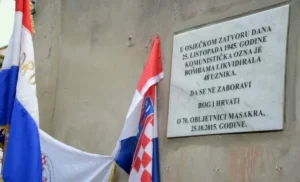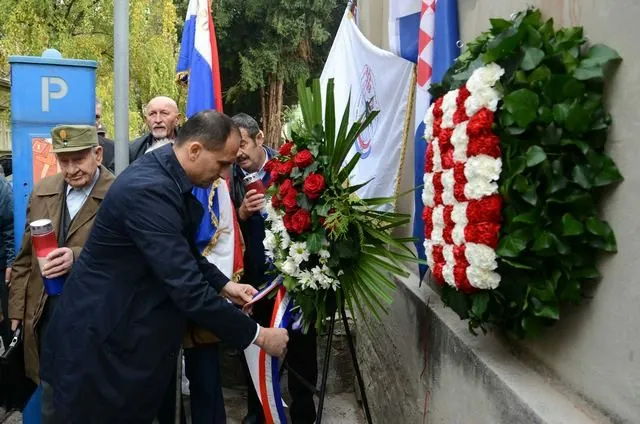With the recent unveiling of a commemorative plaque in Osijek, Croatia has taken an important step in preserving the memory of the victims of communist crimes, overtaking Slovenia, where such commemorations are still practically being “swept under the carpet” under the current government.
A plaque on the wall of the Neuman Street District Prison commemorates the 48 Croatian prisoners who were killed by the Yugoslavian Communist authorities on the 25th of October 1945 with hand grenades and automatic weapons after an alleged prisoner revolt.
“Those prisoners who were here saw people being led away and killed every day. […] When this rebellion happened, the prison administration ordered the liquidation,” Pero Šola of the Coordination of Victims’ Associations said at the unveiling of the plaque, according to the Croatian web portal Komunistički zločini (Communist Crimes). After the massacre, the bodies were taken to the Breza forest near Poganovci and buried there. Victimology associations are still seeking the full truth about the event and are working to have the remains exhumed and the victims identified by DNA analysis, so that they can be buried with dignity in family graves. “We will ask the Ministry of Veterans Affairs to dig up the remains and use DNA analysis to find out who each person is,” Šola stressed.

The plaque was unveiled by Ilija Begovac, the son of one of the victims, Stanko Begovac, which added an emotional touch to the event. The then-Deputy Mayor of Osijek-Baranja County said on the occasion: “In modern Croatia, the time has come to speak out and pay tribute to all the victims of totalitarian regimes, to condemn once and for all all totalitarian regimes and to do everything we can to ensure that nothing like this ever happens again.”
The Coordination of Associations also highlighted the absurd judgements of the communist military courts, based on false accusations, and called for their annulment, similar to the annulment of the judgement against Cardinal Aloysius Stepinac.
Unlike Croatia, where the legacy of totalitarian regimes is being actively confronted through the unveiling of memorials and through public debates, Slovenia is lagging behind in this area. In Slovenia, efforts to commemorate the victims of post-war killings and other crimes of communist rule are still limited, often politically charged or relegated to the margins of public discourse.
While Croatia is opening up space for reconciliation and dignified remembrance through actions such as the installation of a memorial plaque in Osijek, Slovenia has not yet reached the same level of social awareness and institutional support in addressing these issues. Such an approach by Croatia serves as an example of how to deal with historical truth in a respectful and inclusive manner, which could inspire Slovenia to take more decisive steps in this direction.
A. H.


